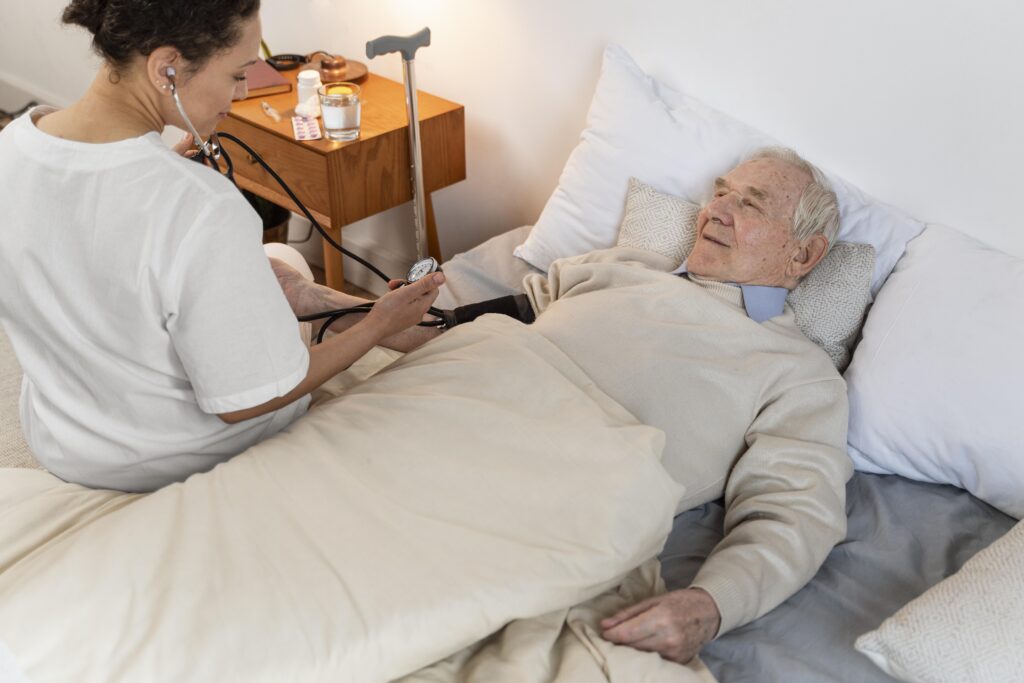What Does In-Home Hospice Care Provide?
Everyone deserves dignity and comfort throughout life’s journey. For seniors facing terminal illnesses, hospice care provides crucial support, enhancing their quality of life and allowing them to find peace in the familiarity of home. While discussing end-of-life care may be challenging, hospice teams offer compassionate guidance to seniors and their families, ensuring they navigate this transition with grace. Home-based hospice care offers comprehensive support, addressing physical, emotional, and spiritual needs during these difficult times.
What is Hospice Care at Home?
Hospice care at home is a specialized form of medical care provided to individuals with terminal illnesses who prefer spending their final days in the comfort of their own homes. It is designed to improve patients’ life conditions by focusing on symptom relief, pain management, and emotional support rather than curative treatments.
A Kaiser Family Foundation survey revealed that the majority of Americans prefer to spend their final days in the comfort of their homes. In-home hospice care provides seniors with this opportunity, ensuring comfort and support through a dedicated care team, essential equipment and resources, and effective pain and symptom management.
End-of-life care encompasses various professionals, including registered nurses, nursing assistants, care aides, and volunteers, as well as family members who may not have medical training. While overseeing the health plan, the primary physician, often in collaboration with a hospice physician, continues to monitor the patient’s well-being throughout their hospice journey.
Benefits of In-Home Hospice Care
When hospice care is provided in the comfort of one’s own home, patients have the opportunity to remain in familiar surroundings, promoting a sense of peace and tranquility during their final days.
- Comfort: Patients receive care in the familiar and comforting surroundings of their own home, which can help alleviate anxiety and stress.
- Personalized care: Hospice care at home allows for individualized care plans customized to the specific needs and preferences of each patient.
- Quality of life: The focus of hospice care is improving the patient’s quality of life by managing symptoms and providing pain relief to ensure maximum comfort.
- Family involvement: Family members can also participate in the caregiving process and spend quality time with their loved ones in a familiar environment.
- Emotional support: Patients and their families receive emotional support from a unique multidisciplinary team of healthcare professionals, including nurses, social workers, and counselors.
- Maintaining dignity and autonomy: Patients can maintain their dignity and autonomy while receiving compassionate end-of-life care in the comfort of their own homes.
- Coordination of services: Hospice teams coordinate medical, social, and spiritual services to provide comprehensive support to patients and their families.

In-home hospice care services
In-home hospice care services are customized to meet the unique needs of each individual, as determined through a comprehensive assessment by the senior’s care team. In-home hospice care generally offers the following services:
- Home visits conducted by a multidisciplinary team, including a hospice physician, nurse, social worker, home care aide, spiritual advisor, and volunteers.
- Administration of pain relief medication and other medications aimed at alleviating symptoms.
- Medical equipment and supplies such as mobility devices, oxygen, hospital-style beds, and bandages are provided.
- Access to physical therapy services.
- Dietary counseling to ensure proper nutrition and hydration.
- Coverage of other pain management services.
- Short-term respite care options for family caregivers.
- Availability of spiritual and grief counseling for family members for up to 13 months following the passing of a loved one.
Ultimately, in-home hospice care empowers patients to live their remaining days with dignity, comfort, and the love and support of their families.
Who Pays For Hospice Care at Home?
In the United States, in-home hospice services are usually covered by Medicare, Medicaid, or private insurance. Medicare Part A reimburses for hospice services if certain requirements are met, including having a terminally ill patient who has worse than a week or a few months to live. This is a wide range of services including medical equipment and supplies, nursing care, medications related to the terminal illness, and mental health counseling for the patient and family members. Medicare may also provide palliative care services, but how a person qualifies and what benefits they receive varies by state. In addition, some benefits, such as the cost of home care, are covered by private insurance. It is important that people carefully review their insurance coverage and discuss payment options with the hospice provider themselves. The goal is for people to get a full understanding of what is covered and what costs they may incur.
Conclusion
In conclusion, in-home hospice care offers a compassionate and holistic approach to end-of-life support, providing patients with the comfort, dignity, and autonomy they deserve during their final journey. Cozy Care Hospice ensures that patients receive personalized care customized to their unique needs and preferences. Through a combination of medical expertise, emotional support, and personalized attention, in-home hospice care strives to improve life conditions for both patients and their families, ensuring that every moment is filled with compassion, respect, and dignity. Ultimately, in-home hospice care is not just about managing symptoms; it’s about honoring the individual’s journey with empathy, understanding, and unwavering support.

